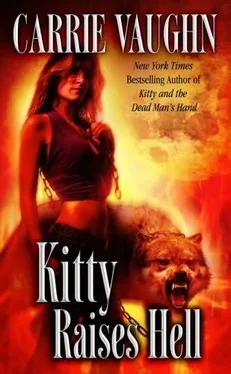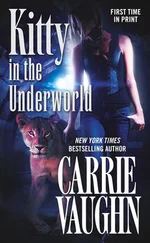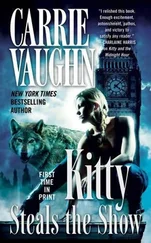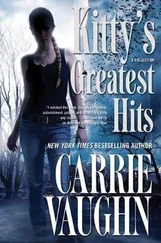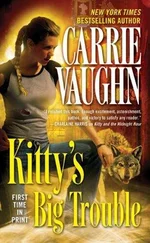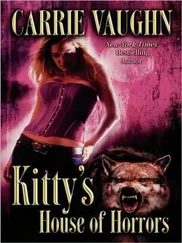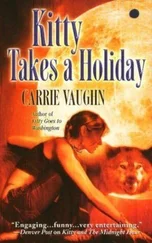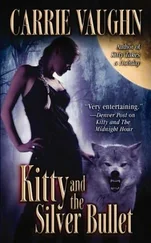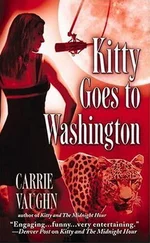He ran, straight for the stage and Odysseus Grant.
I sprang to intercept him. Ben couldn’t hold me this time.
Nick was fast, with a feline grace that gave him a powerful sprint, bent low, head down, strides long, muscles working. I could see the tiger in him, all that instinct and power coming through. He made an inhuman leap and reached the stage easily, his next stride ready to take him to Grant and tackle him.
My own jump across the stage, aiming for Nick, wasn’t nearly as graceful, but it worked. My legs went wild, but my arms got him, wrapped around him, tackled him. Our combined momentums sent us rolling, limbs tangled, bodies hitting the stage and each other. I was going to be seriously bruised after this. And I wasn’t quite sure what the move had gotten me.
Nick didn’t waste time. He kept the roll going until he landed on top of me, wrenched me facedown, and bent back my arm. His breath blew on my cheek, and his teeth closed around my throat, going for blood, with nothing sexy about him at all. Growling, I bucked, looking for the leverage to throw him off me.
Then he was just gone. I scrambled to all fours, bracing for the next attack, sure that Nick had let me go so he could play with me like a cat with a struggling mouse. But no—my pack had come to save me—or at least Ben had. He’d grabbed Nick from behind, arm across his throat, weight bracing him off-balance. Nick kicked and struggled, hissing, spitting around sharp, half-transformed teeth.
This was exactly why wolves traveled in packs. We weren’t meant to hunt by ourselves.
Nick was thrashing, and Ben’s grip was slipping. The struggle showed in his grimace.
Grant opened the door to the box and nodded at me.
I grabbed Nick’s flailing feet and dragged him toward the box. Ben followed my lead. With Nick howling, we managed to wrestle him into place, half throw and half drop him through the doorway. If it had been just a box, Nick’s struggles would have knocked the thing over, but when he fell in, he fell all the way in. I smelled something dank, and a draft came in through the shadowed interior.
Clinging to Ben, I lunged away from the box, lest the thing inside make a grab for us, too. Grant slammed the door shut again.
Ben and I crouched on the stage, gasping for breath, not letting go of each other. My fingers were knotted in his shirt, which was damp with sweat. He’d wrapped his arms around me and stared at the box.
“What the hell is that thing?” he said to Grant.
“Stage prop,” Grant said. “Among other things.”
“Shit,” Ben said, then buried his face in my hair and took a long, comforting breath. I giggled, a tad hysterically.
The rest of the Band of Tiamat approached, stalking like cats but not attacking, fearful maybe, as if unsure of what they’d seen. Grant moved to the end of the stage and addressed them, his voice calm but tired.
“The show’s over. Leave. Scatter. Or follow your masters into that place.”
The half dozen lycanthropes who were left looked at us, looked at each other. Without their show, their alpha, their context, they just looked like young men in jeans and T-shirts. Good-looking, but maybe a bit lost. Would they be able to make it on their own, without their pack? Without their show and their cult? Were they thinking the same thing?
The answer must have been yes, at least to the first one who turned and walked away. One by one, the others did likewise, glancing over their shoulders, resignation settling over their features.
The show was over, and maybe, just maybe some of them were relieved. Maybe this was for the best.
Eyes wide and shocky, Peter emerged from backstage. The theater was quiet now, as if nothing had happened. The box was still, and the scent of fire had faded. The only clues that there’d been a fight were Ben and me, hugging tightly, and Grant, who sat down on the edge of the stage, his shoulders slumping as he ran a hand through his hair.
“It’s over?” Peter said.
Grant looked up at him; his smile was tired, but he was smiling. “It’s over. Though I think it may be time to retire that particular prop.”
It wasn’t over. This battle was over, but Roman—Dux Bellorum—was still out there, scheming and plotting, a major player in the Long Game. This cult had been one of his pawns. He’d tried to use it to get a wedge into Denver, and he’d failed. He didn’t seem like the kind of guy who’d let a defeat like that pass.
For me and my city, this wasn’t over by a long shot.
This time, I was excited about going to visit Cormac in prison.
This wasn’t to say I usually hated going. Hate wasn’t the right word. Seeing how Cormac was doing, live and in person, on a regular basis, was reassuring. But the situation was uncomfortable. The prison, even the visitors’ room, smelled like being trapped to the Wolf side. I hated to think of Cormac being trapped, and he looked terrible in orange.
I brought a file folder with me and, along with Ben, grinned at Cormac through the glass.
“You found something,” he said.
“I did,” I said.
“Which means, I assume, that the demon problem is all fixed and everything’s okay.”
“Would I be smiling if it weren’t?” I said.
“Sorry,” Ben said. “We forgot to tell you. The genie is bottled and everything’s okay.”
Cormac pointed. “See, I know when the problems are solved even when you don’t tell me, because you just stop talking about them. And did you say genie ?”
“Can I tell you about your executions now?” I said quickly, opening the folder. He leaned forward, interested. “If you take in the twenty or so years before and after 1900, there were about half a dozen women executed. There was only one woman executed in 1900.”
“What was her name?” Cormac said.
“Amelia Parker. Her story’s a little different.” I even managed to dig up a few scraps of information here and there, a footnote in an old history book, a couple of hundred-year-old newspaper articles copied off microfiche. I talked like I was delivering a lecture. “Lady Amelia Parker. British, born 1877, the daughter of a minor nobleman. By all accounts, she was a bit of a firebrand. Traveled the world by herself, which just wasn’t done in those days. She was a self-taught archeologist, linguist, folklorist. She collected knowledge, everything from local folk cures to lost languages. She has her own page in a book about Victorian women adventurers.”
Something lit Cormac’s eyes, some recognition, familiarity. He knew something. I stopped myself from calling him on it and demanding that he tell me, because I wasn’t finished with Amelia’s story yet.
“She came to Colorado to follow an interest in Native American culture and lore but was convicted of murdering a young woman in Manitou Springs. The newspaper report was pretty sensationalist, even for 1900. Said something about blood sacrifice. There were patterns on the floor, candles, incense, the works. Like something out of Faust . The newspaper’s words, not mine. She was convicted of murder and hanged. Right here, in fact. Or at least, in this area, at the prison that was standing here at the time.”
Cormac leaned forward. “The victim. How did she die? Did it say what happened to her?”
“Her throat was cut.”
He chewed his lip and stared off into space.
“What is it?” He didn’t say anything, and I pressed. “You know something. This all makes sense to you. Why? How?”
Finally, he shook his head. “I’m not sure. May be nothing. But she’s got a name. It’s not all in my head.”
“What isn’t?”
He looked at me, square on. “She didn’t kill that girl. She was trying to find out who did. What did.”
Читать дальше
